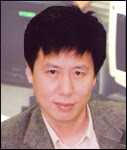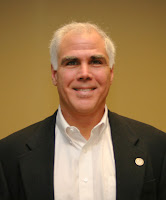 Dr. Yong Zhao on Rethinking the Purpose of Education in a Global Economy
Dr. Yong Zhao on Rethinking the Purpose of Education in a Global EconomyTechnology and Redefined Talents
Dr. Yong Zhao gave a most thought-provoking final keynote at this year's Building Learning Communities Conference. What is not surprising is that the theme of transforming learning environments to prepare students for a completely different kind of world resonated with each of the excellent keynote presentations.
Yong began with the findings from the recent Technology Integration Project (TIP) study results that were published in May. The findings declared:
"Test scores were not significantly higher in classrooms using the reading and mathematics software products than those in control classrooms. In each of the fou groups of product-reading in first grade and in fourth grade, mathematics in sixth grade, and high school algebra-the evaluation found no significant differences in student achievement between the classrooms that used the technology products and classrooms that did not."
The study indicated that software tools don't raise test scores, yet Yong suggests that readers are advised to 'scrutinize the findings carefully as even the Department of Education states that the study 'was not designed to assess the effectiveness of educational technology across its entire spectrum of uses." More on this can be found on the following websites: CoSN, ISTE and SETDA.
The study did recognize that proper implementation of educational software is essential for success.
Yong introduced the book, "The alphabet versus the Goddess;" the premise of the book is that technological advances change society in systemic, yet unpredictable ways e.g. the invention of the alphabet may have led to the diminished value of women in society. This technological advancement caused systemic societal changes which served to favor the left-brain directed capacity among men, thus leading to the devaluation of women in society.
The advancements of the industrial revolution are another example of how technological changes act as extraordinary societal disrupters.
What knowledge is of most worth? --Herbert Spencer posed that question in 1859. The answer was science and that changed the curricula of schools to focus on science and mathematics - both Left Brain-directed (L-directed) aptitudes.
Digital Citizenship
Almost 150 years later, nations are now going to war with Cyberattacks. People are engaged in Cyberwars in China and Taiwan.
People around the world are now engaged in virtual marriage in Second Life. We are now socializing virtually, and negotiating virtually: recently a Second Life user became the first actual millionaire by creating value in a virtual world.
Just think about that for a moment.
The advent of mass virtual collaboration has also led to other less desirable revenue sources such as Gold-farming" and "Digital Produce." We now have digital farmers market where one can raise one's social status - virtually.
There are literally millions of people joining these virtual games and this has led to the growth of actual economies. In China, gamers are playing for a living: there are 100,000 people working in digital sweatshops harvesting points and information about the games, then selling their IP online to wealthier gamers. The actual number isn't known since the process is illegal.
So, what kinds of new talents are needed in this new type of world? How do we prepare kids to prosper in an economy marked by the phenomena of YouTube, Flickr, MySpace and podcasting? What skills and aptitudes are in demand in a medium where people are not just tuning in to shows but running their own shows?
Guttenberg's invention made it possible for everyone to be a reader. The Internet makes it possible for everyone to be an author - of anything.
The Chinese Backstreet Boys are two kids in China who lip-synched their favorite Boy Band then posted their creation on YouTube. It's hilarious! After thousands of hits (like the one you may just have made) t
Technology has historically redefined the talents that are needed to be successful in the world.
And yet, we are still debating if software helps kids learn to read.
Living in the Digital World
We are not just approaching an age globalization, we are in it.
As electrically contracted, the globe is no more than a village --Marshall McLUhan, 1964
"Honey," I confided, "I think the world is flat." -- Thomas Friedman, 2005
Globalization is the global free flow of goods, people, and money.
"McDonaldization" and Starbucks in the Forbidden City in China reflect a new type of "Global Consumerism." These companies bring many changes: e.g. McDonalds does not provide chop sticks in China. McDonalds also forced people in Hong Kong to stand in line in order to be served and this is helping to make people more polite - a big change, evidently.
Evidently, McDonalds has imported more than obesity to China.
Starbucks wasn't that lucky. Apparently, the Chinese government got nervous about having a Starbucks in the Forbidden City and so it was removed - amicably.
"Our students, are affected by global forces, cultural clashes, and different value systems."
So, what type of talents, what type of aptitudes should we develop in our students?
Another example is the Mini. It's a big job to make the Mini based on the Global Supply Chain. Its now not uncommon for the different parts of products to be manufactured in different parts of the world. The MINI is a car whose parts are made in 14 different countries.
Global Trade of Talents is nothing new. To wit: Yao Ming and Herbert Hoover. At 7'6", Yao Ming of China is among the tallest basketball player and arguably the best center in the NBA. Herbert Hoover was once the richest man in the world - he was hired by the Chinese Emperors, since he was a miner, to search for gold to further enrich the Chinese Empire.
In Summary
Consider the following concepts:
*Multiple Identities/Nationalities both virtual and physical;
*Global reach
*Returning to the agricultural mode of production
*Accepting the role of the machines
New World, New Aptitudes
Read Daniel Pink's: A Whole New Mind
Pink's premise is that due to three forces:
Asia
Automation
Abundance
We are moving from the Information Age, dominated by L-Directed Thinking (sequential, literal, functional textual, analytical), to a Conceptual Age where R-Directed Thinking (creativity, emotional astuteness, nonlinear, holistic) must also be developed.
Pink has identified 6 essential aptitudes:
Design
Story
Symphony
Empathy
Play
Meaning
We can now, for a fee, learn Chinese in Second Life. Simply amazing.
Now What?
We must first start with problems - such as re-imagining education; then
Redefine talents and academic success; and finally,
Reconfigure traditional institutions.
It's time to rethink our purpose in education in a global economy.

No comments:
Post a Comment